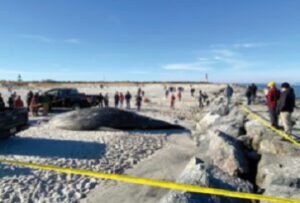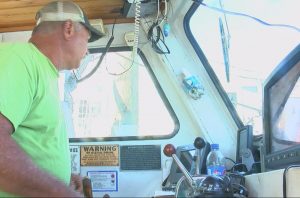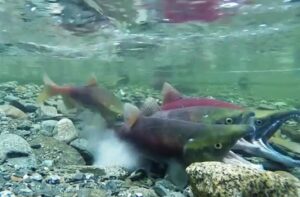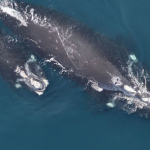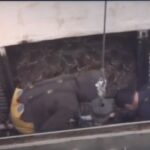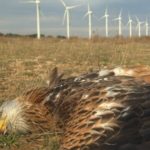Tag Archives: Bernadette Jordan
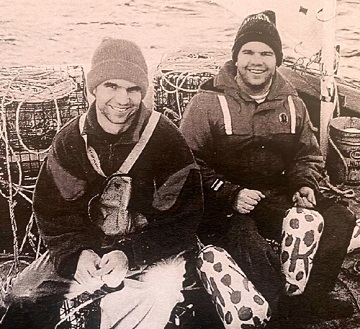
Licence technicality forces son of a Nova Scotia moonlighter lobster fisherman to move away
Mike Kaiser has fished lobster with his father, Dwayne, since he was little. Like many, he wants to carry on the legacy. On Tuesday, Mike Kaiser will move to Alberta to pick up work. He says he’d rather stay in Nova Scotia around his family, doing what his father did for nearly 50 years. But a policy that’s been around almost as long means Dwayne cannot pass on his licence to his son. He holds one of about 70 “moonlighter” licences granted years ago to part-time fishermen in Nova Scotia and New Brunswick. Those licences die with them. >click to read< 11:09
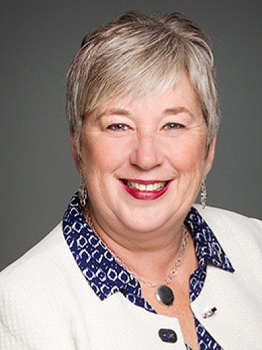
Did Ottawa truly understand the impacts of closing most salmon fisheries on the Pacific coast?
Twenty-one years ago, I married into a fishing family. Soon after, we started Skipper Otto to help connect customers with locally sourced and sustainably harvested seafood. The spring is always the busiest time. There are boats to prepare for the season, fishing nets to repair, staff to hire and operations to launch. At the end of June 2021, when boats had already left the docks and were on the fishing grounds, the federal government announced the closure of 60 per cent of salmon fisheries on the Pacific coast. Specifically, these closures affected commercial salmon fisheries and First Nations communal commercial fisheries. Bernadette Jordan, then minister of fisheries and oceans, announced the closures to reduce pressure on salmon stocks. >click to read< 08:42
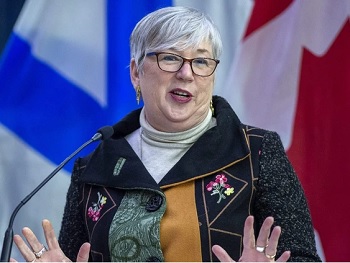
Jordan’s moonlighter lobster licence decision deep-sixed
A 69-year-old Nova Scotia lobster fisherman who wants to sell his licence so he can take care of his two adult children with cerebral palsy has won a judicial review of the former fisheries minister’s decision to reject the transaction. Donald Publicover took the federal government to court after Bernadette Jordan, then fisheries minister, decided Aug. 5, 2020, to turn down the Brookside man’s request for an exemption to transfer his Category B lobster licence, Jordan, fisheries minister until she was defeated by Conservative Rick Perkins in South Shore-St. Margarets last fall turned down that request in a letter dated Aug. 5, 2020. Jordan’s decision was “unreasonable,” according to the judge. >click to read< 10:05

A year ago violence erupted in the lobster fishery, “moderate livelihood” fishery status unresolved
One year ago, confrontation and violence upended the normally business-like commercial lobster season in St. Mary’s Bay and Lobster Fishing Area 35 in southwest Nova Scotia. Tensions between Indigenous and non-Indigenous fishermen in the bay had erupted in several dangerous boat-ramming incidents.,, But a full year later, as the wheels of justice turn ever so slowly, none of those charged have entered a plea. Before we examine how that happened, it’s worth noting some updates in the troubled fishery. >click to read< 10:07
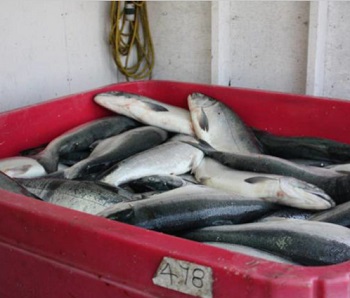
Commercial harvesters “financially devastated” – 79 B.C. commercial salmon fisheries closed for the 2021 season
The abrupt closure of nearly 60 per cent of B.C. salmon fisheries this summer has left commercial harvesters “financially devastated,” according to a survey by the United Fishermen & Allied Workers’ Union. The survey, which was open to both members and non-members of UFAWU-Unifor, found the unexpected loss of income to have been the biggest blow to harvesters following the effects of the pandemic on the industry.,, For a lot of commercial harvesters, the retirement plan is their boats, gear and licence. In ideal circumstances, if you are a licence-holder, you can sell your licence with your boat when you are ready for retirement,,, >click to read< 15:16
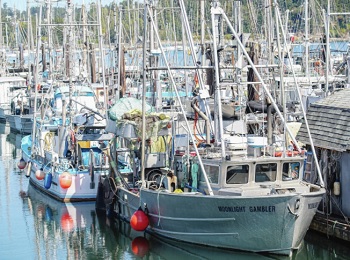
Commercial salmon fishers reeling from sweeping closures
Fourth-generation fisherman Jordan Belveal of Nanaimo was ready to head north on his boat Blue Bayou to catch coho July 1 in Dixon Entrance, between B.C. and Alaska, when he heard about the widespread closures. Although he says he doesn’t mind keeping his boat tied to the dock if it means preserving some runs, Belveal opposed the closures, saying some fisheries with a good abundance of salmon have been cancelled. Losing the  coho fishery has had a “major effect on us,” said Belveal, who operates Island Wild Seafoods with wife Catlin, selling hook-and-line caught sustainable wild seafood to Vancouver Island customers. Belveal is now counting on the Aug. 12 chinook fishery off Haida Gwaii, which would normally have opened in June but was delayed to allow fish to head to their home rivers on Vancouver Island and to the Fraser River, >click to read< 09:56
coho fishery has had a “major effect on us,” said Belveal, who operates Island Wild Seafoods with wife Catlin, selling hook-and-line caught sustainable wild seafood to Vancouver Island customers. Belveal is now counting on the Aug. 12 chinook fishery off Haida Gwaii, which would normally have opened in June but was delayed to allow fish to head to their home rivers on Vancouver Island and to the Fraser River, >click to read< 09:56
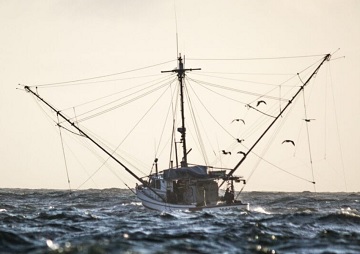
DFO’s sweeping salmon fishery closures leave workers reeling – Commercial fishers are paying the price,,,
“When we got that news, we’re like, shit, what do we do? And then there’s a little glimmer of hope, they didn’t say Area 4 was going to be closed for sure. That’s where I’m sitting now.” Carpenter, who is 54 years old, said waiting for the federal Fisheries and Oceans Department’s next move is a “huge gamble.” He said he has things he can do to earn money and fill his freezer if he can’t go out and fish but he’s worried about some of the older fishers who don’t have the same options. “What are they supposed to do? They’re going to go home, they may drink themselves to death or they may lose their marriages, their houses, sell everything. Who knows?” >click to read< 17:57
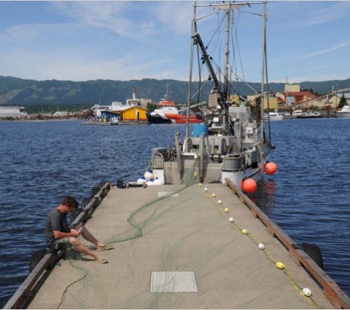
British Columbia: Fishermen left high and dry over sudden DFO closures, financial relief needed.
Gord Johns, NDP MP for Courtenay-Alberni, is calling on the federal Minister of Fisheries and Oceans to provide immediate relief to salmon harvesters following the sudden announcement by her department to close 60 percent of commercial salmon fisheries on the west coast of British Columbia. “This decision has blindsided fish harvesters, many of whom have already heavily invested in fishing equipment and supplies for the season and now face financial hardship,” Johns wrote in a letter to the minister, Bernadette Jordan. >click to read< 09:10
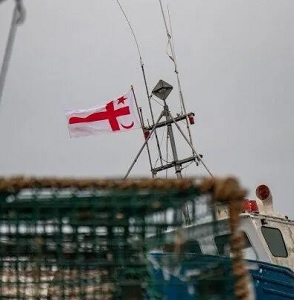
The Sipekne’katik First Nation has indefinitely postponed the start of a communal lobster fishery
The band said it was concerned for the safety of its fishermen and lacked resources to launch the fishery in St. Marys Bay. “The reality is that we would need to provide our own security and police our own gear getting seized and it feels like a costly prospect for our community after all that we have lost,” Chief Mike Sack said in a news release. The decision to postpone came following an emergency meeting of fishermen at Sipekne’katik on Wednesday morning. >click to read< 14:06
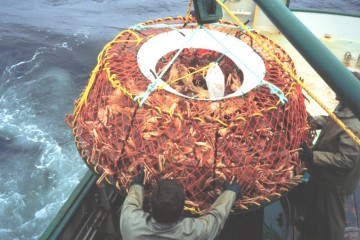
2021 Newfoundland and Labrador Snow crab quotas going up by 29 per cent
Today, the Honourable Bernadette Jordan, Minister of Fisheries, Oceans, and the Canadian Coast Guard, announced that the 2021 Snow crab fishery in Newfoundland and Labrador will have a total allowable catch (TAC) of 38,186 tonnes.“Our government understands how important the Snow crab fishery in Newfoundland and Labrador is to the provincial economy, and to rural and coastal communities. After taking steps in recent years to protect the health of the Snow crab population and ensure long term sustainability of the stock, I am very pleased to share that, for 2021, the total allowable catch will be increasing across nearly the whole province. >click to read< 10:22
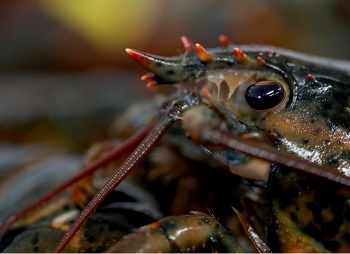
DFO: moderate livelihood fisheries must occur during commercial season
The Trudeau government will announce conditions for the authorization of moderate livelihood fisheries Thursday, including the expectation that those fisheries take place within existing commercial seasons. The Assembly of Nova Scotia Mi’kmaw Chiefs did not respond to a request for comment, but Mi’kmaw leaders and some academics have insisted the moderate livelihood fishery poses no risk to stocks because it is too small. The office of Fisheries and Oceans Minister Bernadette Jordan declined to comment in detail on DFO’s position until it is released Thursday, except to say the decision is based on conservation. >click to read< 07:10

Canada outlines its 2021 measures to protect North Atlantic right whales
The Government of Canada remains committed to protecting the endangered North Atlantic right whale. To help prevent entanglements with fishing gear, Fisheries and Oceans Canada is building on last year’s successful measures by continuing to close fishing areas wherever and whenever North Atlantic right whales are present in the Gulf of St. Lawrence, Bay of Fundy, and Roseway Basin Critical Habitat,,, To help prevent collisions with vessels, Transport Canada will be re-implementing its 2020 season measures, including a restriction on vessel speed throughout much of the Gulf of St. Lawrence to protect areas where whales are detected,,, >click to read< 17:06
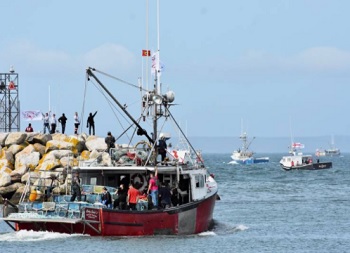
Failed policies, decisions on the fly: How the moderate livelihood fishery file blew up
Documents obtained through a freedom of information request show the federal Fisheries Department knew that 21 years of kicking the moderate livelihood issue down the election cycle had resulted in there being little rule of law on St. Mary’s Bay. The feds knew that the bay had become a pressure cooker as two communities were pitted against one another over a limited resource. When the top blew off, they turned to coming up with new policy on the fly while seeking a daily scorecard on evolving public opinion. “This is about a culture (in Ottawa) that would rather avoid any conflict at all,” said Thomas Isaac, an aboriginal rights lawyer who has served as British Columbia’s chief treaty negotiator,,,>click to read< 13:49
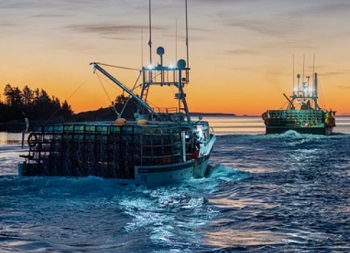
‘There’s Death Threats’: Indigenous Fishers Nervous as Nova Scotia’s Commercial Lobster Season Opens
Some Mi’kmaq have fished alongside commercial fishermen on these wharves for years but this year, after violence erupted in the past few months, they’re now divided largely by race—the white Acadian fishermen at Meteghan, and the Mi’kmaq at Saulnierville, with each flying their own flags. A court injunction, sought by the Mi’kmaq, has further separated the two groups, in an effort to prevent any more aggression and harassment towards band members on the Saulnierville wharf and on the water as they continue to fish until Dec. 17, the end of their moderate livelihood plan. The commercial inshore lobster fishery, expected to launch later this week, runs until the end of May. >click to read< 20:37
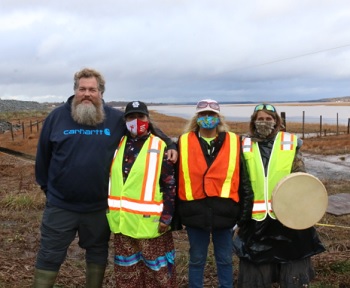
Highway 101 shut down as Avon River causeway protestors urge action to allow free fish passage
On Nov. 16, Howe was among the dozens of people who gathered to hold a ‘respectful, reduced traffic flow’ on Highway 101. The majority of traffic was detoured but some trickled through, starting and stopping in six-minute intervals to reflect the short time frame that fish have to pass through the gated structure. It was an inconvenience to many motorists – but according to fisherman Darren Porter, it was a necessary move. “At the end of the day, how else do you get media here?” asked Porter, while surrounded by water defenders. Porter has been drawing attention to the limited fish passage in Windsor for several years. >click to read< 07:38

Membertou First Nation Chief Paul leaves Assembly of Mi’kmaq Chiefs in split over moderate livelihood
Chief Terry Paul has stepped down from the Assembly of Nova Scotia Mi’kmaq Chiefs due to a disagreement over how moderate livelihood negotiations are being conducted. Paul, who is chief of Membertou First Nation in Cape Breton, had served as the fisheries lead for the assembly’s negotiation arm called the Kwilmu’kw Maw-klusuaqn Mi’kmaq Rights Initiative (KMKNO). Negotiations fell apart last week between that body and Fisheries and Oceans Canada over the implementation of a moderate livelihood fishery by the Mi’kmaw. Paul said Wednesday that the KMKNO is not adequately representing all of the province’s first nations. “I feel that not all the communities are being treated the same way,” >click to read< 13:34
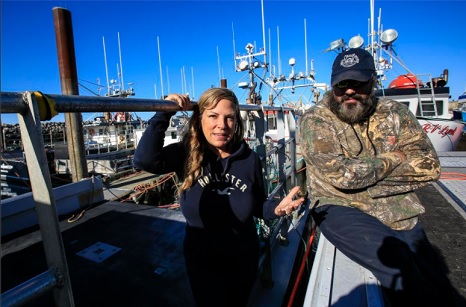
He had hoped to help end Nova Scotia fishery tensions, but now this union leader feels he just has to step down
It’s an ebb tide; in the afternoon sun in the Acadian fishing village of Meteghan, the Salt Shaker hangs low on the wharf. It seems appropriate. Comeau’s resignation has scuttled one of the few potential bright spots in a tumultuous week in southwestern Nova Scotia’s lobster fishery conflict; the hope that talks between him and Sipekne’katik chief, Mike Sack, might be the first steps towards a solution to the battle between Indigenous and non-Indigenous fishers.“ Now, the planned talks are dead, and the conflict that has torn the fishing community apart has no end in sight. >click to read< 08:18
 N.S. fishermen’s union head quits, says lobster dispute is ‘too much of a toll’ on his family – Joel Comeau says it’s no longer safe for him to be the president of the Maritime Fishermen’s Union Local 9 in Nova Scotia. Comeau stepped down Friday ahead of a planned meeting with Sipekne’katik First Nation Chief Mike Sack to discuss the increasingly tense dispute between commercial and Mi’kmaw lobster fishermen in the province. >click to read< 10:44
N.S. fishermen’s union head quits, says lobster dispute is ‘too much of a toll’ on his family – Joel Comeau says it’s no longer safe for him to be the president of the Maritime Fishermen’s Union Local 9 in Nova Scotia. Comeau stepped down Friday ahead of a planned meeting with Sipekne’katik First Nation Chief Mike Sack to discuss the increasingly tense dispute between commercial and Mi’kmaw lobster fishermen in the province. >click to read< 10:44

Trudeau defends federal response as threats escalate over Mi’kmaw fishery in Nova Scotia
“We are expecting the RCMP and police services to do their jobs and keep people safe,” Trudeau said. On Thursday, the chief of the Sipekne’katik First Nation urged Trudeau to step in and make sure those involved in the violence are prosecuted. The vice-president of a fishermen’s union in Nova Scotia has stepped down, citing fears for his family’s safety as threats from some non-Indigenous fishermen opposed to a self-regulated Mi’kmaw lobster fishery continue to escalate. Joel Comeau, a former member of the Local 9 of the Maritime Fishermen’s Union, was supposed to meet with Sack on Friday morning but abruptly cancelled the meeting. Comeau said he’s received “a lot of flak from my people and a lot of intimidation” over his willingness to work with Sack to find a way forward. “This community is out of hand. This community feels unsafe,” said Comeau. >click to read< 16:00
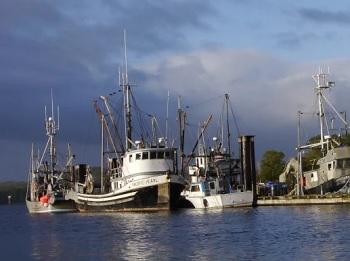
B.C. harvests 196,000 tonnes of fish a year. Most of it is exported and that’s a problem
There are about 4,000 fish harvesters scattered across the province who harvested about 196,000 tonnes of wild seafood in 2018, worth $476 million, everything from salmon to crab to geoducks. Most of that seafood didn’t stay in Canada. The province exports all but about 15 per cent of its annual catch each year and, like most of Canada, imports between 70 and 90 per cent of the seafood British Columbians eat, according to federal data. The licensing policies that give fish harvesters the right to fish the B.C. coast have privatized access to seafood and put them on the open market. >click to read< 07:50

Yelling, cursing, but no physical confrontation – Lobster dispute between Indigenous and commercial fishers boils over again
Another contentious chapter in a very long dispute over Indigenous fishing rights and federal laws on conservation has begun. Thursday saw a handful of Indigenous lobster boats head out of southwestern Nova Scotia to lay traps using ‘licences’ handed out by a local Mi’kmaw chief and not from the federal Fisheries and Oceans Canada department (DFO). Commercial lobstermen in the area staged protests this week saying the Mi’kmaw are fishing out of season and illegally. The fishery is closed as it’s molting season when lobsters renew their shells, and mating season. They say the law closing the fishery for several months is necessary for conservation purposes and fishing at this time is not sustainable. >click to read< 10:11
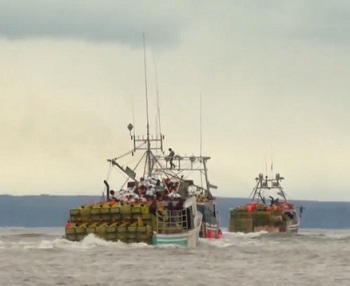
Calls from Sipekne’katik First Nation for government and RCMP to uphold rule of law
A letter from the Sipekne’katik First Nation addressed to Bernadette Jordan, the Minister of Fisheries and Oceans, Premier Stephen McNeil and the Royal Canadian Mounted Police is calling on all three parties to uphold the rule of law amidst ongoing violence, threats, human rights discrimination and what they say is an ongoing failure to uphold a 1999 Supreme Court of Canada decision recognizing the Mi’kmaq right to fish and trade. “The Supreme Court of Canada, the treaties and the Royal Proclamation, Canadian laws recognize the right of the Mi’kmaq to fish and trade,” said Cheryl Maloney, consultation director for the Sipekne’katik First Nation. >click to read< 18:29
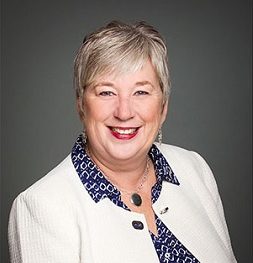
Atlantic Canada Fish harvesters still waiting for federal Coronavirus aid to flow
As the policy analyst for CFIB in P.E.I., in early May I worked with my colleagues to write a letter to the Minister of Fisheries and Oceans and Member of Parliament for Nova Scotia’s South Shore, Bernadette Jordan. This letter pleaded for help for fish harvesters, the folks who risk their lives on the water harvesting one of Atlantic Canada’s most important resources and exports, lobster. Lobster harvesters were deeply concerned about a quickly evaporating market and a glut of product driving down the price of their livelihood.,, While this was going on, the federal government was rolling out its array of programs to subsidize business: the Canada Emergency Business Account (CEBA) , the Canada Emergency Response Benefit (CERB), the Canada Emergency Wage Subsidy (CEWS) and the Canada Emergency Commercial Rent Agreement (CECRA). by Marley Kingston >click to read< 07:43
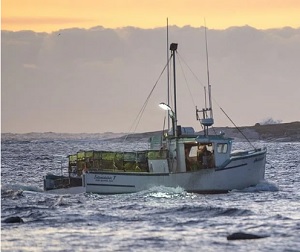
“Things could’ve been way worse”: Spring lobster season nears end amid coronavirus, “Things are stabilizing”
The Maritime Fishermen’s Union predicted a gloomy forecast for the spring season with the pandemic’s safety concerns, crushed markets and reduced processing capacity. But fishermen are taking it “day-by-day,” says the union’s executive director. “Things could’ve been way worse,” says Martin Mallet. “At least our fishermen have had a chance to go out and catch part of their catch.” Restaurants reopening is also helping market demand increase. >click to read< 08:49

Here’s how to get a piece of $62.5 million in fish processors’ Coronavirus aid
It’s been two months since the federal government rolled out a $62.5-million aid package to support seafood processors affected by Coronavirus, and a $469 million program to aid fish harvesters. So far no one has seen a cent of funding from either package. Today, June 16, seafood processing companies are a little closer. Bernadette Jordan, Minister of Fisheries and Oceans Canada, announced details of how the $62.5 million from the Canadian Seafood Stabilization Fund (CSSF) will be divvied up across Canada, and how to apply. Of the $62.5 million, Atlantic Canada gets the lions’ share — $38.1 million. Seafood processors in Quebec and Western Canada will also get a share of CSSF. >click to read< 14:48
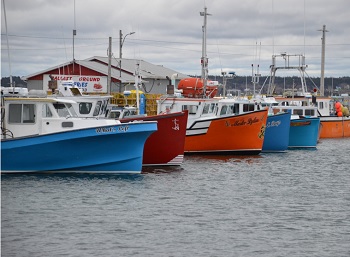
Coronavirus: Uncertainty faces lobster fishermen as season opens in Cape Breton on Friday
The lobster fishing season will begin in area 26B and 27 on Friday, but the uncertainty of the world market has left many wondering what the season will hold for them. “The world market has collapsed, things are opening a little bit, so we’re seeing a little bit of hope,” said Marlene Brogan of Ballast Ground Fisheries in North Sydney. “Should the second wave of this virus hit, we don’t know where it’s going to leave us, so it’s concerning.” For the past six weeks, Brogan has had numerous conference calls with processors, fish organizations, fish harvesters and buyers from the local area, all hoping to receive further guidance from the federal government. “The federal fisheries minister (Bernadette Jordan) has not offered anything to the fishers,” said Brogan. Video, >click to read< 19:31
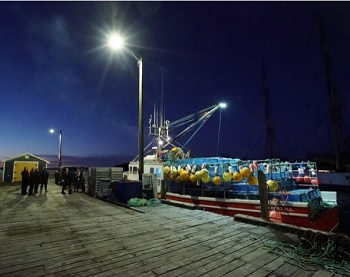
Federal Fisheries Minister Bernadette Jordan says financial aid for fishermen in Atlantic Canada is days away.
The pledge comes amid both economic and health concerns caused by the Coronavirus pandemic and $252 million in aid announced for Canadian farmers and food processors this week. The pandemic has already delayed the start of the lucrative spring lobster fishery in the Gulf of St. Lawrence as processors warn about slumping demand and their ability to safely process the glut that will arrive when catches land after the season opens May 15. “We know that [harvesters are] going to have some very challenging times this season and we will have more to say about that and what we will be able to do in the coming days,” Jordan said Tuesday during a virtual sitting of Parliament. >click to read< 11:15
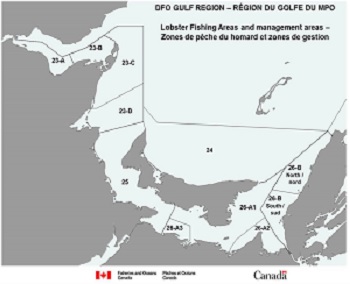
Some P.E.I. fishermen feeling left out of lobster market
This year due to considerations around the coronavirus (COVID-19 strain) pandemic, P.E.I. lobster fishers will be setting traps on May 15 instead. Beach Point fisher Brayden Handrahan says he was ready to fish April 30 as usual, and he says he’s not alone. “That’s when everybody gets the most lobster, in the first two weeks, and that’s why everybody wants to go,” he said. Federal Fisheries Minister Bernadette Jordan said her department chose May 15 after fishers in licensed fishing areas (LFAs) 24 and 26a voted on the date. Ian MacPherson, executive director of the P.E.I. Fishermen’s Association, who co-ordinated the vote, says it was close, but the majority asked for a delay. By the time the vote was underway, many felt it was too late for the season to start on time, said MacPherson. As the decision date approached, Jordan added a “new wrinkle” by including processors into her considerations, he said. >click to read< 09:50

Trudeau pledges $62.5M for fish and seafood sector amid mounting food supply concerns
Prime Minister Justin Trudeau has announced $62.5 million for Canada’s fish and seafood sector amid mounting concerns over the state of the country’s food supply.,, Keith Sullivan, president of Fish, Food and Allied Workers, a trade union representing 15,000 workers in Newfoundland and Labrador, called the financial relief “encouraging”. “Harvesters from all of Atlantic Canada right across to B.C. have been looking for some relief since the pandemic began,” Sullivan.,, Federal Fisheries Minister Bernadette Jordan said in a Saturday news conference that help for harvesters is on its way. >click to read< 14:00
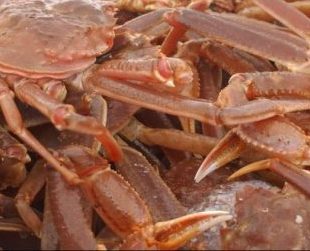
Feds delay Snow Crab season in Gulf of St. Lawrence
The Department of Fisheries and Oceans said the decision on Thursday to pause the season will let everyone involved in the fishery to put necessary health and safety measures in place. Seafood processors in the Maritimes had called on Ottawa to delay the crab and lobster season, warning that moving ahead with fishing risks workers’ health — and the bottom line — amid the COVID-19 pandemic.,, New Brunswick Premier Blaine Higgs said Thursday the province hopes Fisheries and Oceans Canada will delay the spring season for a few weeks, with the possibility of federal compensation. The Maritime Fishermen’s Union, which represents 1,200 harvesters in New Brunswick, said Friday they support a delay of the lobster season until May 15 >click to read< 16:28



































